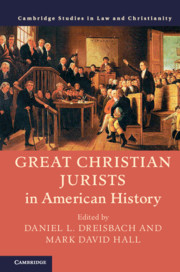Book contents
- Great Christian Jurists in American History
- Law and Christianity
- Great Christian Jurists in American History
- Copyright page
- Dedication
- Contents
- Contributors
- Preface
- Introduction: Christianity and American Law
- 1 John Cotton and Roger Williams
- 2 John Winthrop and the Covenantal Ideal
- 3 Friendly Laws: William Penn’s Christian Jurisprudence
- 4 The Friendly Jurisprudence and Early Feminism of John Dickinson
- 5 Roger Sherman, Oliver Ellsworth, and the Formation of America’s Constitutional Order
- 6 John Jay: The First Chief Justice
- 7 James Wilson
- 8 Was Justice Joseph Story a Christian Constitutionalist?
- 9 Harvard’s Evangelist of Evidence: Simon Greenleaf’s Christian Common Sense
- 10 John Marshall Harlan the Elder
- 11 Judicial Conservatism and Protestant Faith: The Case of Justice David J. Brewer
- 12 John T. Noonan, Jr.: Catholic Jurist and Judge
- 13 The Integrative Christian Jurisprudence of Harold J. Berman
- 14 Antonin Scalia: Devout Christian; Worldly Judge?
- 15 The Insights and Transitions of Mary Ann Glendon
- 16 A Reformed Liberalism: Michael McConnell’s Contributions to Christian Jurisprudence
- 17 The Jurisprudence of Robert P. George
- Index
9 - Harvard’s Evangelist of Evidence: Simon Greenleaf’s Christian Common Sense
Published online by Cambridge University Press: 24 June 2019
- Great Christian Jurists in American History
- Law and Christianity
- Great Christian Jurists in American History
- Copyright page
- Dedication
- Contents
- Contributors
- Preface
- Introduction: Christianity and American Law
- 1 John Cotton and Roger Williams
- 2 John Winthrop and the Covenantal Ideal
- 3 Friendly Laws: William Penn’s Christian Jurisprudence
- 4 The Friendly Jurisprudence and Early Feminism of John Dickinson
- 5 Roger Sherman, Oliver Ellsworth, and the Formation of America’s Constitutional Order
- 6 John Jay: The First Chief Justice
- 7 James Wilson
- 8 Was Justice Joseph Story a Christian Constitutionalist?
- 9 Harvard’s Evangelist of Evidence: Simon Greenleaf’s Christian Common Sense
- 10 John Marshall Harlan the Elder
- 11 Judicial Conservatism and Protestant Faith: The Case of Justice David J. Brewer
- 12 John T. Noonan, Jr.: Catholic Jurist and Judge
- 13 The Integrative Christian Jurisprudence of Harold J. Berman
- 14 Antonin Scalia: Devout Christian; Worldly Judge?
- 15 The Insights and Transitions of Mary Ann Glendon
- 16 A Reformed Liberalism: Michael McConnell’s Contributions to Christian Jurisprudence
- 17 The Jurisprudence of Robert P. George
- Index
Summary
In 1846, Simon Greenleaf wrote a learned tract, “The Testimony of the Evangelists,” that proved the truth of Gospels by applying the rules of evidence that govern common law trials. Greenleaf’s “Testimony” enjoys a lively internet presence among evangelical Christians today, despite Greenleaf’s nearly forgotten status among the legal profession and academics. This chapter describes Greenleaf’s manifold contributions as a founding faculty member of Harvard Law School, a rigorous law teacher, and an influential scholar whose treatise on evidence shaped nineteenth-century law. Historians, however, have mostly ignored Greenleaf’s deep commitment to evangelical Christianity. The oversight is unfortunate because Greenleaf consciously wove his evangelical beliefs into his teachings and writings, including his evidence treatise and his “Testimony,” by drawing from the core principles of the Common Sense Tradition, an evangelical mainstay. It is argued that Greenleaf’s Common Sense assumptions greatly influence current law even if their origins are unrecognized.
- Type
- Chapter
- Information
- Great Christian Jurists in American History , pp. 161 - 178Publisher: Cambridge University PressPrint publication year: 2019

